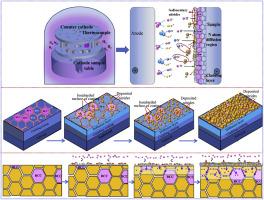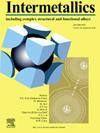Al0.5CoCrFeNiTi0.25 HEAs 覆层离子氮化层的微观力学性能研究
IF 4.3
2区 材料科学
Q2 CHEMISTRY, PHYSICAL
引用次数: 0
摘要
为了研究离子氮化对高熵合金镀层微观结构和性能的影响,通过激光熔覆制造了 Al0.5CoCrFeNiTi0.25 高熵合金镀层,随后对其进行了离子氮化处理。通过对比分析,研究了熔覆涂层和离子氮化层的相组成、微观结构和性能。此外,还研究了氮化层的形成机理。XRD 结果显示,Al0.5CoCrFeNiTi0.25 HEA 涂层由双相 FCC 和 BCC 相组成,而氮化层则由高氮 FCC 固溶体和氮化物(如 AlN、CrN、Fe4N 和 TiN)组成。离子氮化后,氮化层的表面形貌呈现出 "菜花状 "氮化物颗粒,随着氮化时间的延长,这些颗粒变得更加致密。值得注意的是,氮化层的显微硬度约为 HEA 涂层的四倍,而且离子氮化后堆焊涂层的耐磨性和耐腐蚀性也得到了显著改善。在离子氮化过程中,N 原子与合金元素反应形成氮化物,氮化物优先沉积在晶界和 BCC 相上并水平生长。当沉积层遍布整个表面时,氮化机理从反应控制转变为扩散控制,N 原子向内扩散,与高氮固溶体形成扩散层。随着氮化时间从 1 小时延长到 12 小时,扩散层的厚度从 11.77 μm 增加到 96.07 μm。本文章由计算机程序翻译,如有差异,请以英文原文为准。

Investigation on Microstucutres and properties of ion nitriding layer of Al0.5CoCrFeNiTi0.25 HEAs cladding coating
To investigate the effect of ion nitriding on the microstructures and properties of high entropy alloy coatings, the Al0.5CoCrFeNiTi0.25 high entropy alloy coating was fabricated via laser cladding and subsequently subjected to ion nitriding treatment. A comparative analysis were conducted to investigate the phase compositions, microstructures and properties of cladding coatings and ion nitriding layer. Furthermore the formation mechanism of the nitriding layer was studied. XRD results revealed that Al0.5CoCrFeNiTi0.25 HEA coatings consisted of duplex FCC and BCC phases, whereas the nitriding layer was composed of high-nitrogen FCC solid solutions and nitrides such as AlN, CrN, Fe4N and TiN. Following ion nitriding, the surface morphology of nitriding layer presented “cauliflower-like” nitride particles, which became denser with the extended nitriding time. Notably, the microhardness of nitriding layer was approximately four times that of HEA coating, and the wear resistance and the corrosion resistance of cladding coating were improved significantly after ion nitriding. During ion nitriding process, N atoms reacted with the alloying elements to form nitrides, which preferentially deposited at grain boundaries and BCC phases and grew horizontally. As the deposition layer spread across the entire surface, the nitriding mechanism shifted from reaction -controlled to diffusion-controlled, with N atoms diffusing inward to form a diffusion layer with high nitrogen solid solutions. With the prolong of nitriding time from 1h to 12h, the thickness of the diffusion layer increased from 11.77 μm to 96.07 μm.
求助全文
通过发布文献求助,成功后即可免费获取论文全文。
去求助
来源期刊

Intermetallics
工程技术-材料科学:综合
CiteScore
7.80
自引率
9.10%
发文量
291
审稿时长
37 days
期刊介绍:
This journal is a platform for publishing innovative research and overviews for advancing our understanding of the structure, property, and functionality of complex metallic alloys, including intermetallics, metallic glasses, and high entropy alloys.
The journal reports the science and engineering of metallic materials in the following aspects:
Theories and experiments which address the relationship between property and structure in all length scales.
Physical modeling and numerical simulations which provide a comprehensive understanding of experimental observations.
Stimulated methodologies to characterize the structure and chemistry of materials that correlate the properties.
Technological applications resulting from the understanding of property-structure relationship in materials.
Novel and cutting-edge results warranting rapid communication.
The journal also publishes special issues on selected topics and overviews by invitation only.
 求助内容:
求助内容: 应助结果提醒方式:
应助结果提醒方式:


